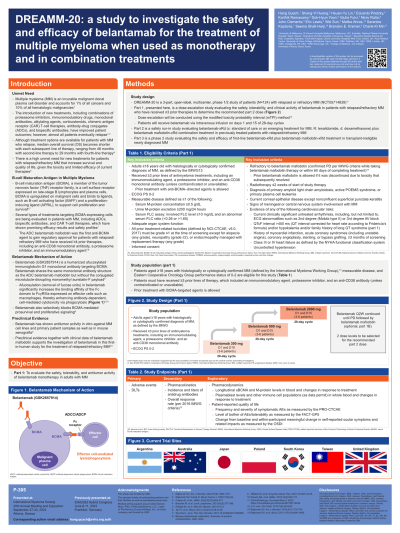Treatment of Relapsed/Refractory Myeloma
Poster Session 2
P-305: DREAMM-20: A STUDY TO INVESTIGATE THE SAFETY AND EFFICACY OF BELANTAMAB FOR THE TREATMENT OF MULTIPLE MYELOMA (MM) WHEN USED AS MONOTHERAPY AND IN COMBINATION TREATMENTS
Thursday, September 28, 2023
12:30 PM - 1:30 PM EEST

.jpg)
Hang Quach, MBBS(Hons) SpecCertOC FRACP FRCPA MD
Director of Haematology
St Vincent’s Hospital Melbourne, University of Melbourne, VIC, Australia
Melbourne, Victoria, Australia
Introduction: MM is an incurable malignant clonal plasma cell disorder and accounts for 1% of all cancers and 10% of all hematologic malignancies. Treatments include combinations of proteasome inhibitors (PIs), immunomodulatory drugs, monoclonal antibodies, alkylating agents, and corticosteroids as well as the newer chimeric antigen receptor T-cell therapies, antibody-drug conjugates (ADCs), and bispecific antibodies. As relapse usually occurs, there is a high unmet need for effective treatments with better safety profiles, given the toxicity of current and emerging treatments. B-cell maturation antigen (BCMA), a cell surface receptor, is upregulated on MM cells. Belantamab (GSK2857914) is a humanized afucosylated immunoglobulin G1 monoclonal antibody targeting BCMA. Belantamab shares the same antibody structure as the ADC belantamab mafodotin but without the conjugated monomethyl auristatin-F payload. Based on preclinical data, belantamab mediates antibody-dependent cellular cytotoxicity through increased FcγRIII binding and antibody-dependent cellular phagocytosis, and blocks BCMA-activated prosurvival and proliferative signaling. Preclinical evidence supports clinical investigation of belantamab for MM.
Methods: Part 1 of DREAMM-20 is a phase 1/2, open-label, multicenter, dose-escalation study of patients with relapsed or refractory MM to determine the safety, tolerability, and recommended part 2 dose for belantamab. Inclusion criteria include patients aged ≥18 years with confirmed MM (defined by the International Myeloma Working Group [IMWG]), measurable disease, Eastern Cooperative Oncology Group performance status of 0 to 2, and adequate organ system function. Patients must have received ≥3 prior lines of therapy, which included an immunomodulatory agent, a PI, and an anti-CD38 antibody (unless contraindicated or unavailable). Prior receipt of BCMA-targeted agents is allowed. Key exclusion criteria include current corneal epithelial disease except nonconfluent superficial punctate keratitis, meningeal or central nervous system involvement with MM, uncontrolled hypertension, and evidence of clinically significant untreated arrhythmias. Patients will receive belantamab via intravenous infusion on days 1 and 15 of 28-day cycles. Dose escalation is conducted using the modified toxicity probability interval method. The primary endpoint is the incidence of adverse events, including dose-limiting toxicities, which will be assessed using National Cancer Institute Common Terminology Criteria for Adverse Events v5.0. Secondary endpoints include pharmacokinetics, incidence of antidrug antibodies, and overall response rate (assessed per the 2016 IMWG criteria). Exploratory endpoints include quality of life, pharmacodynamics (including longitudinal soluble BCMA and M-protein levels), and other biomarker assessments.
The trial is sponsored by GSK and registered at ClinicalTrials.gov (NCT05714839).
Results: N/A
Conclusions: N/A
Methods: Part 1 of DREAMM-20 is a phase 1/2, open-label, multicenter, dose-escalation study of patients with relapsed or refractory MM to determine the safety, tolerability, and recommended part 2 dose for belantamab. Inclusion criteria include patients aged ≥18 years with confirmed MM (defined by the International Myeloma Working Group [IMWG]), measurable disease, Eastern Cooperative Oncology Group performance status of 0 to 2, and adequate organ system function. Patients must have received ≥3 prior lines of therapy, which included an immunomodulatory agent, a PI, and an anti-CD38 antibody (unless contraindicated or unavailable). Prior receipt of BCMA-targeted agents is allowed. Key exclusion criteria include current corneal epithelial disease except nonconfluent superficial punctate keratitis, meningeal or central nervous system involvement with MM, uncontrolled hypertension, and evidence of clinically significant untreated arrhythmias. Patients will receive belantamab via intravenous infusion on days 1 and 15 of 28-day cycles. Dose escalation is conducted using the modified toxicity probability interval method. The primary endpoint is the incidence of adverse events, including dose-limiting toxicities, which will be assessed using National Cancer Institute Common Terminology Criteria for Adverse Events v5.0. Secondary endpoints include pharmacokinetics, incidence of antidrug antibodies, and overall response rate (assessed per the 2016 IMWG criteria). Exploratory endpoints include quality of life, pharmacodynamics (including longitudinal soluble BCMA and M-protein levels), and other biomarker assessments.
The trial is sponsored by GSK and registered at ClinicalTrials.gov (NCT05714839).
Results: N/A
Conclusions: N/A
